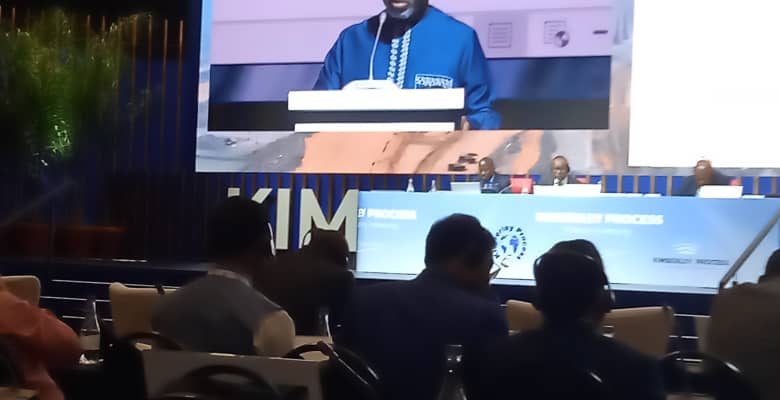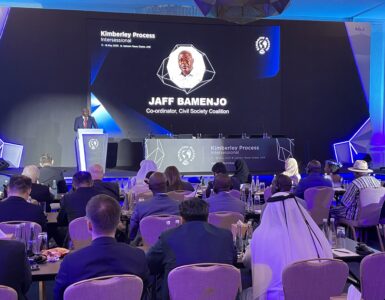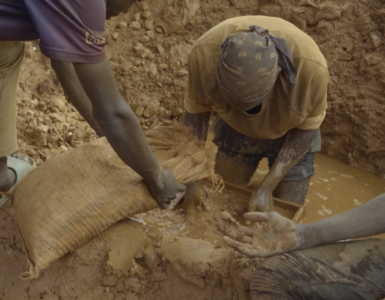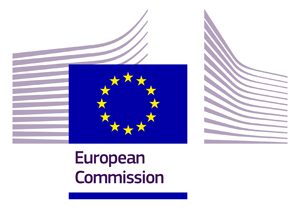It is a privilege and a great honour for me to address you again as the Coordinator of the Kimberley Process Civil Society Coalition (KPCSC).
First of all, I would like to express my sincere thanks from those of the Civil Society Coalition delegation to the Government of Botswana, especially to the organisers of this plenary meeting. Thank you for hosting our delegation in Gaborone.
Mr. KP Chair, all Coalition members and I are extremely grateful for what you and your team did to get me healthy again. I feel much better this morning.
On behalf of the Coalition, I also want to thank the organisers of the exciting Summit in which we participated yesterday, which brought together excellent personalities, opinion leaders and experts from around the world.
Distinguished guests, ladies and gentlemen,
As we reflect on the decade of the KP’s existence, we are taken aback by the continuous crisis mode of the certification scheme. The KP has dragged from one failed reform cycle to another. We fail to discuss the problems that concern us all, or to expose the obstructive forces in this room that hold this entire process in their grip.
Most mining communities in Latin America, Africa and the Ukrainian people are counting loss of lives, environmental damage and human rights violations caused by diamond mines or by states whose budgets are largely based on revenues from diamond production and trade.
The KP does not look into how irresponsibly-managed diamond are destroying lives, livelihoods and the environment.
This has resulted in perennial complaints from communities as witnessed by the diamond mining affected communities in Lesotho, marginalised affected property owners of Koidu in Sierra Leone and communities living along Tshikapa and Kasai Rivers in the Democratic Republic of Congo. The fate of the Jagersfontein community in South Africa, where burst tailings dams flooded and displaced communities awaits many other diamond mining communities worldwide, particularly in Africa where most of the rough diamonds are produced. For instance, the Patising community in Lesotho near the Letseng Diamond mine.
Distinguished guests, ladies and gentlemen,
The KP does not allow discussions on how the world’s biggest diamond producing country, Russia, uses diamond revenue to finance a cruel war against Ukraine, a fellow KP member. We don’t even discuss how mercenaries from this same country are undermining peace and efforts to stop the trade in conflict diamonds in the Central African Republic. Instead, we see applications for future chairmanship coming in from participants, Belarus and the United Arab Emirates. We also see a rush to membership from Rwanda, a country which according to several UN reports is fuelling aggression against a Kimberley Process member, the Democratic Republic of Congo (DRC), through its support for an armed group.
Ladies and gentlemen, we call for the suspension of the evaluation of this application until Rwanda’s motives and actions on the ground in the DRC and CAR are clarified.
The KP civil society coalition is accountable to the communities that are living the realities of diamond mining. We take that seriously. The cry for reform is not the KP CSC’s cry only, it is called for by the communities that we work with on a daily basis. The credibility of the scheme is at stake, now more than ever. Countries, the industry and communities will all benefit from a strong reliable Kimberley Process that makes sure diamond mining benefits countries, communities and consumers. Only a considerable expansion of the conflict diamond definition and a robust reform of the KP’s governance can achieve that.
As we move towards 2023 which is a KP reform year, it is important for Zimbabwe as incoming Chair to set out its planned goals and modalities for achieving consensus on expanding conflict diamond definition and helping in finding a lasting solution on how the KP can address any situation that might give rise to diamond related human rights violations in any part of the world. We all found comfort this year that Zimbabwe turned the corner on such matters when the Review Visit found a lot of positives. It should not slide back. It should instead be the torch bearer on reforming the KP on expanding the definition.
The long overdue expansion of the KP’s conflict diamond definition should include diamonds associated with widespread or systematic violence and serious violations of human rights, regardless of whether they are committed by rebel groups, criminals, terrorists, private or public security forces or any governmental actor.
The reform process, however, needs to go beyond the expansion of the definition and also address governance and decision making:
– Consensus, for example, is only valuable when it is solution-oriented through compromise, not when it is used as a veto, which is in fact a means of blocking any serious discussion.
– For a consensus model to work, we need full transparency: KP participants must be fully transparent in the positions they take and share information. This is a precondition for a meaningful and solution-oriented consensus model.
– The tripartite arrangement can only be genuine if all actors have an equal voice in discussions and an equal contribution to finding consensus. The tripartite arrangement needs to be visible and tangible at every level. To cover that, the KP should adopt an AD on tripartite arrangements at national or regional level and support the creation of platforms as we see in Zimbabwe, Sierra Leone, and the Mano River Union Regional Approach.
– This brings us to the peer review mechanism: We saw the added value of a regional approach at work during the review visit to Sierra Leone, which saw genuine engagement and exchange between the three KP pillars. A credible and strong KP should be committed to and committed to the inclusion of communities in peer review visits.
The strange thing in the KP is that the failure to reform is not due to widespread opposition from Participants. There’s a silent majority that never speaks up, but undoubtedly has much to say. To make sure all voices are heard, we urge the outgoing chair and the incoming chair to
– organise a truly inclusive reflection on the KP’s shortcomings in the sessions proposed during this plenary
– consider a ministerial meeting on Kimberley Process reforms to take stock of the political will of all participants to achieve reforms.
Distinguished guests, ladies and gentlemen;
We invite you all to share your ideas for KP reform this week, be it orally or in writing, bilaterally or in Plenary. The coalition, as watchdogs to this process will keep track of all expressions of political will for meaningful KP reform in order to give all of us, and the broader public, a better view of the progressive and obstructive forces in this process, and to finally achieve the long awaited reform.
Thank you for your kind attention.
Dr. Michel YOBOUE
For the KP-CSC




